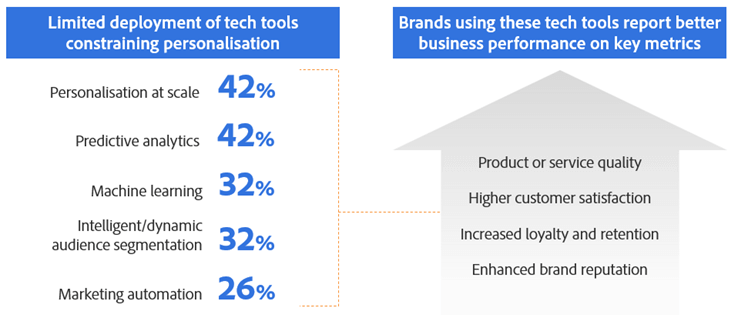47% of consumers in Malaysia like AI brand interactions, but just 1 in 10 brands use generative AI for better customer experience, an Adobe study finds.. (Image – Shutterstock).
Malaysia’s AI divide: consumers embrace, brands lag
- 47% of consumers in Malaysia like AI brand interactions, but just 1 in 10 brands use generative AI for better customer experience, an Adobe study finds.
- In Malaysia, many brands haven’t adapted AI guidelines to meet consumer trust needs. Only 10% have internal usage policies.
- Why are brands lagging behind their customers in adopting AI?
In a digital age dominated by AI, Malaysian consumers increasingly lean towards AI-assisted brand interactions, with 47% expressing a preference for such interactions over human ones, surpassing the global average of 39%. However, despite this burgeoning consumer demand, Adobe’s latest State of Digital Customer Experience report reveals a significant disparity between consumer preferences and brand readiness in Malaysia.
The report underscores a consumer appetite for AI-enabled tools and services, particularly when exploring new products and services. Yet, Malaysian brands are lagging behind their global counterparts in harnessing the latest AI innovations to enhance customer experience (CX). Only 8% of Malaysian brands utilize generative AI to bolster CX initiatives, a stark contrast to the 18% globally. Moreover, just 6% of Malaysian brands are establishing upskilling initiatives to leverage generative AI, trailing behind the global average of 11%.

Adobe: most are yet to adopt the data-driven technology tools and capabilities needed to deliver personalisation at scale and keep pace with customer preferences.
While there’s a glimmer of hope as some brands in Malaysia demonstrate awareness of the organizational implications of adopting AI, with 22% briefing senior leadership, the overall progress remains sluggish. However, there’s a silver lining as Malaysian brands are poised to elevate their generative AI capabilities in the coming year, with 33% prioritizing it as their primary CX focus.
Consumers leading on AI in Malaysia
“Consumers are swiftly embracing generative AI-led experiences. While brands in Malaysia are lagging in terms of AI adoption, our findings indicate that this will soon evolve as Malaysia, as well as other Asian markets, are well poised for an accelerated uptake amid continued realization of the direct benefits that generative AI offers and its strong position as a technological hub,” Simon Dale, VP of Adobe Asia said.
Dale added that when it comes to business strategies, most brands in Malaysia acknowledge that improving the CX is of top or significant priority. “This is driving brands to focus on evolving their digital experiences, underscored by a strategic emphasis on flexible and highly personalized interactions,” he added.
Nevertheless, bridging the gap between consumer expectations and brand initiatives poses a significant challenge. Malaysian consumers desire unified, seamless experiences across online and in-person interactions, yet most brands struggle to deliver personalized experiences at scale. Data-driven technology tools and capabilities necessary for personalization remain underutilized, impeding brands’ ability to keep pace with evolving consumer preferences.
“More than two-thirds of consumers in Malaysia (77%) want brands to offer the same level of personalization online and in-person, and they want unified, seamless experiences in every interaction. However, meeting this expectation remains a top brand challenge,” the Adobe report reads. That’s not it. Privacy and security concerns loom large, with consumers wary of data misuse and lack of transparency in data practices.
Despite 69% of Malaysian consumers expressing willingness to boycott brands that aren’t transparent about data use, only 26% of brands perceive this as impacting retention. This disconnect underscores the need for brands to prioritize transparency and establish robust data privacy policies.
“Consumers have emphasized that their most impactful brand experiences are relevant and personalized to their preferences. As brands continue to digitalize at full speed to meet expectations, it is crucial that they also strategically navigate data privacy and security concerns so as not to jeopardize their relationship with customers,” noted Dale.
After all, as brands delve into generative AI, consumer apprehensions about data privacy intensify. Many fear unauthorized data use and excessive data collection, highlighting the critical need for brands to implement stronger AI guardrails and internal usage policies. In conclusion, while Malaysian consumers embrace AI-driven brand interactions, Malaysian brands are struggling to keep pace, falling short in leveraging AI innovations to meet consumer expectations.
As the digital landscape evolves, Malaysian brands must prioritize AI adoption, transparency in data practices, and robust internal policies to bridge the gap and foster trust with consumers in an increasingly AI-driven world.
READ MORE
- Safer Automation: How Sophic and Firmus Succeeded in Malaysia with MDEC’s Support
- Privilege granted, not gained: Intelligent authorization for enhanced infrastructure productivity
- Low-Code produces the Proof-of-Possibilities
- New Wearables Enable Staff to Work Faster and Safer
- Experts weigh in on Oracle’s departure from adland


